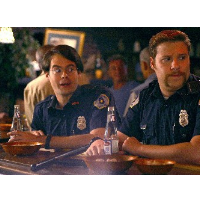How Often are Law Enforcement Officers Drunk on the Job?
 (photo: Superbad)
(photo: Superbad)
Recent reports from disparate parts of the country suggest that drunk policing may be a bigger problem than the public realizes—and that law enforcement agencies are struggling with it.
A recent internal memo by Chief Michael Fisher of the Border Patrol, which is part of U.S. Customs and Border Protection, reveals that the Border Patrol has been “averaging almost two alcohol-related arrests [of its own agents] per week,” which the memo terms “alarming and detrimental to the overall well-being of our workforce." With about 22,000 border patrol agents nationwide, two arrests per week would yield an annual arrest rate of 0.47%.
Whistleblowers told San Diego Channel 10 reporters that drunken agents are sometimes allowed to carry firearms and drive agency vehicles. “People are showing up to work drunk,” said one unnamed agent. “I want to see this addressed and to end the secrecy of what's going on. We've had agents who have said to supervisors, 'I think I'm still drunk' and they still get the keys to their car and automatic weapons.”
San Diego Border Patrol Sector Chief Paul Beeson denied those allegations. “What I'm aware of is that if an instance like that were to occur, supervisors are not going to let them go out in the field,” Beeson insisted. “Policy prohibits it.” Beeson admitted that so far in 2013, 9 of his 2,600 agents have been arrested for drinking and driving. Starting in January, Border Patrol agents will be required to take alcohol-awareness classes as part of a program named after an agent was killed by a drunk driver in 2010.
Meanwhile in Ohio, police in some communities are explicitly allowed to work even when they have blood alcohol levels that could get them ticketed if they were pulled over, according to the Hamilton Journal-News. A review of labor contracts for public safety officers in Ohio found that cops and firefighters are often protected from discipline when they show up for duty with alcohol in their systems.
In Lebanon (pop.: 20,033), for example, cops and firefighters can work with a .04 blood alcohol level, and used to be allowed to suck on a breath mint before testing. Pointing out that mints distort Breathalyzer readings, police Chief Jeff Mitchell said that when he “came across that, I thought, ‘Wow, that’s different.’ Doesn’t that sound odd to you that you would have that in a contract with police?”
Under Ohio law, drivers under 21 can be ticketed for drunk driving for blood alcohol content above .02—meaning an officer could write a ticket to someone more sober than he or she is. “It’s an interesting double standard,” said DWI attorney Patrick Mulligan, who also opined that “I don’t think it’s one the general public would appreciate.”
The .04 standard was bargained into virtually all state employee state contracts years ago, according to Ohio Highway Patrol spokeswoman Lt. Anne Ralston, based on a federal law making it illegal to operate a commercial vehicle at above .04. Some locales in southwestern Ohio like Hamilton, Middletown and Mason, have nevertheless implemented zero-tolerance policies.
Finally, in New York last week a federal appeals court ruled that a New York Police Department (NYPD) policy of administering a Breathalyzer test to any officer who kills or injures someone with a gun is constitutional. The court rejected a suit brought by the Patrolmen's Benevolent Association of the City of New York, which represents 35,000 New York cops, arguing that NYPD Interim Order 52(IO 52) violated the Fourth Amendment rule against unreasonable searches and seizures.
Writing for a three-judge panel, U.S. Judge Reena Raggi held that the policy falls under the "special needs" doctrine, which allows warrantless drug and alcohol testing of public employees engaged in hazardous duties. “Sobriety is a fitness-for-duty condition of employment with the NYPD,” wrote Raggi. “Thus, a sobriety determination serves special needs distinct from criminal law enforcement, specifically, personnel management of, and maintaining public confidence in, the NYPD.”
The policy was established to bolster public confidence in the NYPD’s ability to investigate officers who kill or hurt people with their guns, the court noted.
“Because NYPD officers are authorized to carry firearms and to use deadly force, they have a diminished expectation of privacy in employer testing that ensures their fitness for duty,” states the ruling, which also found the testing policy “constitutionally reasonable as a matter of law.”
-Matt Bewig
To Learn More:
US Border Patrol Has 'Alarming' Alcohol Problem, Says Internal Memo and Inside Source (by Mitch Blacher, ABC 10 News)
Some Cops Allowed to Work after Drinking (by Josh Sweigart, Hamilton Journal-News)
NYPD Can Test Breath of Officers in Shootings (by Heather Johnson, Courthouse News Service)
- Top Stories
- Unusual News
- Where is the Money Going?
- Controversies
- U.S. and the World
- Appointments and Resignations
- Latest News
- Trump to Stop Deportations If…
- Trump Denounces World Series
- What If China Invaded the United States?
- Donald Trump Has a Mental Health Problem and It Has a Name
- Trump Goes on Renaming Frenzy






Comments